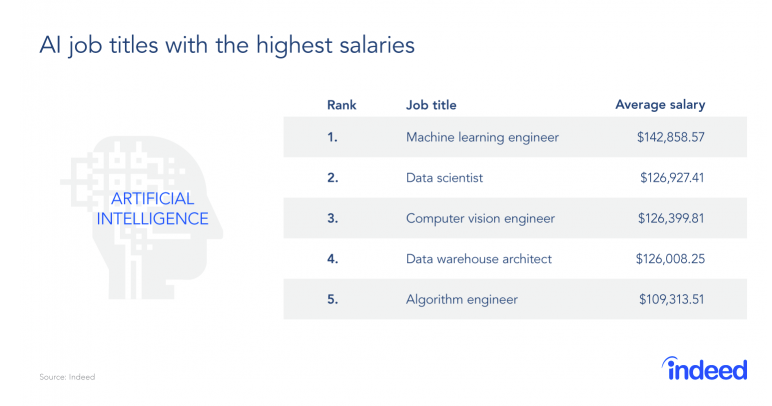Artificial intelligence (AI) is a rapidly growing field and the talent market is hot. Because of this demand, AI engineer salaries continue to increase.
According to a LinkedIn report, AI Intelligence Specialist — which is a catchall title for multiple AI-specific roles — was named one of the top 15 emerging jobs for 2020 with 74% annual growth. Not only is this an in-demand role, but AI engineers can command a top salary and report high levels of job satisfaction, making it a highly appealing career option.
If you’re considering entering the field of AI (or upgrading your skills), it’s helpful to know what you can expect when it comes to AI engineer salaries.
How Much are AI Engineer Salaries?
While the data varies, one thing is clear: The average annual salary of an AI engineer is well over $100,000. The average national salary in the U.S. is $114,121 based on data from Glassdoor, with a low of $78,000 and a high of $150,000.
Indeed.com reports an even higher annual salary for an AI engineer at $141,001, with many of the jobs being concentrated in key U.S. cities including the San Francisco Bay Area, Seattle, New York and Washington, D.C.
Highest Paying Cities in the U.S. for Machine Learning Engineers
- San Francisco Bay Area, CA – $187, 353
- Bellevue, WA – $173,241
- San Francisco, CA – $172,138
- Boston, MA – $166,513
- New York, NY – $153, 590
- Sunnyvale, CA – $140, 212
- Cambridge, MA- $133,322
- San Diego, CA – $125, 069
Machine learning engineers currently top the average salary range for the AI category, according to Indeed.com.

What Do AI Engineers Do?
AI engineers oversee the building and testing of AI models. They look at everything from dealing with system maintenance to screening for problems, and their role is to act as a decision-maker for the AI models they’re working on.
Most AI engineers come from a background that includes a degree in mathematics with a focus on engineering, robotics, physics or computer science. A basic knowledge of linear algebra and calculus, as well as probability and statistics, is highly beneficial.
While the ability to do things like write algorithms is a necessity, there are other skills that make AI engineers highly sought after, and can contribute to receiving top AI engineer salaries. Analytical thinking and programming in languages, particularly Python, and object-oriented programming, are an essential part of being an effective AI engineer.
The programming knowledge required by AI engineers is critical as the algorithms required for machine learning aren’t like traditional programming. The algorithms have to perform without any human intervention, which means the changes that have to be made are for the neural networks, as opposed to regular strings of code.
It’s these specialized skills, coupled with the constantly evolving landscape of AI that means engineers in the field are continually looking for new opportunities to grow and evolve. This makes this field even more competitive.
Looking towards the remainder of 2020 and beyond, AI engineers will continue to be in demand in multiple industries, including tech, financial services, government, and consulting. AI engineer salaries are often dictated by the company type, with AI-specific roles available with employers ranging from brand name retailers to big banks to NASA. Your company may even already offer AI Training solutions you can take advantage of.
Building Your Skills for Future Growth
The number of career opportunities for AI engineers are rapidly expanding and AI engineer salaries will continue to climb. The key to landing one of these higher-paying roles comes down to having the right skills and training.
Looking to expand your own skills, get a leg up in the world of AI, and make yourself even more appealing to potential employers?
The Udacity Nanodegree will help you learn essential Artificial Intelligence concepts from AI experts like Peter Norvig and Sebastian Thrun — including search, optimization, planning, pattern recognition, and more.







